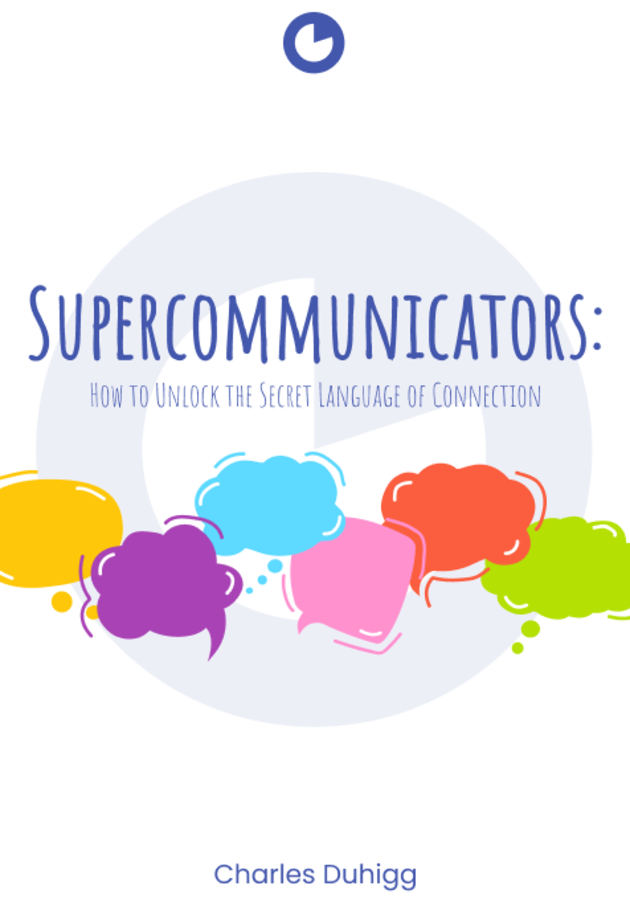In this book, author Charles Duhigg takes readers on a journey of mastering the art of effective and quality communication. Through his experiences as a journalist and a New York Times reporter, Duhigg reveals the complexities of human connection and presents a series of insights into why some conversations leave us feeling fulfilled. In contrast, others leave us feeling empty and drained.
His expertise in crisis negotiation provides a unique backdrop for exploring conversation dynamics. With an uncanny ability to connect with people from all walks of life, he shares the secrets of his success, emphasizing the importance of empathy, authenticity, and active listening. Drawing on principles from psychology, sociology, and communication theory, Duhigg demonstrates how small conversation choices can profoundly impact our ability to connect with others.
At the book's heart lies the concept of the three kinds of conversation: practical, emotional, and social. Duhigg argues that understanding and navigating these different types of dialogue is essential for effective communication. By adopting a "learning conversation" approach, where individuals seek to understand and empathize with others' perspectives, he suggests that meaningful connections can be forged even in the most challenging circumstances.
Through exciting and engaging anecdotes and practical advice, Supercommunicators offers readers a roadmap for improving their ability to connect with others and hone communication skills to build stronger relationships. Whether navigating professional challenges or personal relationships, Duhigg's insights provide a valuable framework for fostering understanding and connection in an increasingly polarized world.
In a time when effective communication is more important than ever, "Supercommunicator" serves as a timely reminder of the power of meaningful conversation to bridge divides and cultivate deeper connections among individuals and communities alike.
Handling meaningful conversations in a divided world
Whether referred to as love, friendship, or simply engaging in enlightening discussions, building genuine, meaningful connections is the most essential thing in life. Duhigg's illuminating book takes us into the methods of enhancing interpersonal communication, drawing from extensive research and real-life instances spanning Netflix boardrooms, jury deliberations, sitcom sets, NASA missions, and CIA operations.
The book demonstrates how applying these principles reshapes discourse, fostering understanding among divergent viewpoints and nurturing essential connections by dissecting contentious discussions on topics like gun control, vaccines, and race. In an era marked by dwindling civility due to rampant internet use, the landscape is marred by abuse, mutual misunderstanding, and a callous disregard for individual humanity, values, and experiences, where winning, shaming, and coercing conformity reign supreme.
Duhigg has provided a universal guide, empowering us to enrich and fortify our relationships and fostering a culture of peace and empathy amid pervasive polarization. It prompts introspection, probing why we sometimes struggle to truly listen, comprehend, empathize, or communicate our thoughts and emotions. Longitudinal research, corroborated by multiple studies, highlights the climactic role of profound familial and social bonds in nurturing longevity and happiness, affirming the indispensable role of meaningful conversations and communications in forging such deep connections.
The significance of actively listening, empathizing, and engaging with others emotions
The central lesson of this book emphasizes applying these principles to forge deeper connections and to empathetically engage with the humanity and experiences of those with whom we disagree. The author highlights a burgeoning body of research spanning two decades that elucidates why some conversations thrive while others falter, offering insights to enhance our ability to listen attentively and communicate effectively. These principles transcend specific contexts, proving universally applicable rather than confined to familial or workplace relationships.
While some may be novel, others may echo familiar advice from personal therapy or previous readings, affirming their efficacy in practice. The principles can be categorized into three primary domains: understanding the underlying essence of discussions (pertaining to practical decision-making), navigating emotional exchanges, and negotiating social dialogues that intersect with our identities. Given the dynamic nature of conversations, these categories often intermingle, yet alignment within the same conversational realm is essential for fostering meaningful connections and avoiding discord. Effective communication necessitates active listening, thoughtful questioning, and the articulation of our emotions.
To master the art of communication, one must attune to spoken and unspoken cues, pose pertinent questions, empathize with others' moods, and express their feelings transparently. The book gives us valuable answers to important issues that uncover deeper insights, distinguishing between factual questions—which frequently lead to conversational stagnation—and those that motivate people to discuss their values and experiences.
While sharing feelings might initially provoke discomfort, the book's examples illustrate how it transforms mundane small talk into enriching exchanges that propel conversations forward.
Ethical communication in a skeptical society
Following each chapter, Duhigg included a segment titled 'A Guide to Using These Ideas,' which revisited earlier points and provided practical applications for real-life conversations, often accompanied by illustrative graphs. The book's narrative flowed smoothly, enriched by intriguing research studies and case examples, catering even to those typically averse to psychological concepts. However, certain aspects of the subject matter tread a fine line, particularly when considering negotiations or attempts to persuade others.
An example involving vaccinations, though informative, may deter some readers due to its controversial nature. Duhigg recounts a doctor's struggle to communicate the importance of vaccinating children to anti-vaxxer parents. He discovered that success relied less on presenting facts and more on establishing personal connections, acknowledging shared humanity, and avoiding a condescending tone. However, the realization that someone is strategically trying to persuade you can engender distrust. The framing of vaccination as the only morally acceptable choice and the implication that dissenters lack compassion further exacerbates this skepticism.
While open to considering the vaccine's potential benefits, the perceived coercion and superiority complex attached to the persuasion effort undermine trust and border on manipulation. Overcoming distrust requires genuine care, empathy, and a sincere desire to understand others rather than viewing effective communication as a mere means to an end. Furthermore, the tendency to label groups, as seen in political discourse, exacerbates polarization, perpetuated by both right and left-wing factions. This divisive tactic hinders meaningful dialogue and contributes to societal polarization.
In the past decade, there has been a significant rise in the proportion of Americans expressing deep anger towards the opposing political party, with nearly 70 percent of the electorate reporting such sentiments. Approximately half of the population believes that individuals with differing political views are morally deficient, lazy, dishonest, or unintelligent. This trend perpetuates a pattern where individuals are hastily judged based on their beliefs, leading to sweeping generalizations and unwarranted assumptions about their character.
Effective communication transcends the need to assert one's correctness and instead emphasizes recognizing the humanity in those we converse with, acknowledging their unique perspectives, emotions, and life journeys. By doing so, we dismantle the barriers erected by broad generalizations and stereotypes, allowing for a more nuanced understanding of individuals as multifaceted beings rather than mere caricatures or labels.
Building bridges through understanding
The tribal mentality and the psychology of in-group versus out-group dynamics are pervasive forces in our cultural landscape. We inherently tend to categorize and assign labels to individuals, favoring and respecting those who share our beliefs or resemble us while harboring distrust and disdain toward those who do not. Duhigg illustrates this phenomenon with an experiment to gauge whether individuals on opposing sides of the gun control debate could engage in civil discourse.
Despite maintaining their original viewpoints, participants could communicate more effectively when they shared personal vulnerabilities and recognized each other's humanity. This realization transformed their perception of the "other side" from being inherently evil to fellow human beings with similar aspirations, albeit with differing approaches. Listening, rather than debating, means allowing people to express their viewpoints and attempting to understand the underlying reasons for their opinions, even if disagreement persists.
However, these insights are limited, mainly when decisions must be made and laws enacted. While developing a sense of connection and comprehension is crucial, practical considerations often involve reaching agreements and discerning truths. Decisions regarding issues such as gun ownership or marriage rights require evaluating competing viewpoints, and not all perspectives carry equal weight in such discussions.
Redefining understanding: Beyond agreement to perception
What exactly does "understanding" mean? According to the author, comprehension does not always need agreement, and our definition of understanding may differ from what we expect. Many people seem to equate being understood with eventual agreement: "If they truly understood me, they'd see why I'm right." But what does reaching an understanding look like in discussions centered on identity, where conflicting parties bring vastly different worldviews and moral standards?
Moving forward in productive conversation becomes challenging when we must navigate people's emotions and perceptions, which may be rooted in misinformation.
A Harvard Law student shared a profound insight: resolving conflict isn't about winning but uncovering the underlying reasons for the dispute and the narratives each party constructs. Using looping, conversations gain clarity and trust, which signals genuine engagement with the other person's perspective.
While Duhigg advocated for understanding differing perspectives, certain viewpoints appeared marginalized in his discourse. Although he did not explicitly state this, he inferred from his narrative, acknowledging that it might not align with his intended message. For instance, when discussing Dave Chappelle's Netflix special and its aftermath, Duhigg described Chappelle as "becoming a pariah after making homophobic comments," a term carrying solid connotations. Without specific context from Chappelle's special, whether these comments were directed at anything specific remains unclear. However, the term "homophobic" typically denotes rhetoric that condemns homosexuality without room for nuanced interpretation.
Moreover, Duhigg's subsequent mention of GLAAD, an organization monitoring media for bias against the LGBTQ community, further suggests a predisposition towards viewing disagreement with LGBTQ beliefs as bias rather than merely representing a different worldview. While it's plausible that GLAAD aims to identify discriminatory treatment, the prevailing trend seems to target dissenting opinions beyond mere prejudice. This approach seemed to overlook applying Duhigg's principles universally, instead of categorizing those who disagree with LGBTQ beliefs as "homophobic and biased" without delving into the underlying reasons for their viewpoints.
Strategies for dealing with identity in personal and professional situations
The author explains the dynamics and challenges of discussing identity-related topics, particularly race, in various contexts, such as personal relationships and workplace settings. He emphasizes the importance of open and honest dialogue while acknowledging the discomfort and anxiety often accompanying such discussions. He stresses the significance of preparation and acknowledging discomfort before engaging in challenging conversations.
Duhigg advocates for focusing on personal experiences rather than generalizations, fostering empathy and understanding while reducing the risk of unintentionally perpetuating identity threats.
Creating safe spaces for dialogue is highlighted as absolutely necessary, involving the establishment of guidelines and structures that encourage the respectful sharing of perspectives. Continuous learning and improvement are also emphasized, with organizations encouraged to implement training programs and workshops to facilitate discussions about identity and inclusion.
Leadership and accountability are critical factors in creating inclusive environments, with leaders playing a decisive role in setting the tone for discussions and addressing employee concerns. Accountability mechanisms ensure employees' voices are heard and respected, even in difficult conversations. Overall, Duhigg points out the importance of confronting discomfort, embracing vulnerability, and striving for genuine understanding and connection in discussions about identity and inclusion. Through intentional dialogue and reflection, individuals and organizations can work towards building more equitable and supportive communities.
Transforming difficult conversations into opportunities for growth
The author discusses the obstacles we face in many areas of life. These talks can be about anything from performance issues at work to personal relationships or family concerns like a relative's drinking habits. These discussions are challenging because they often touch on sensitive areas that challenge someone's self-image. For instance, criticizing a colleague's work performance might feel like an attack on their intelligence or work ethic. However, we all understand that these conversations are unavoidable. So, it's crucial to approach them with mindfulness and strategy. The author outlines a three-step plan: before, at the beginning, and as the conversation unfolds.
Before getting into it, it's essential to think about your goals, what you want to say, and what you hope to learn. You also need to anticipate obstacles and plan to address them, like calming nerves or encouraging everyone to speak up.
At the outset of the conversation, setting ground rules is critical. Everyone needs to feel safe expressing themselves without fear of blame or attack. It is also fundamental to define emotional and practical goals and recognize that discomfort is normal and good for growth.
As the conversation progresses, it's about drawing out everyone's identities and ensuring equal participation. Genuine connections are fostered by acknowledging shared experiences or respectfully exploring differences. And don't underestimate the impact of the environment on the conversation's tone and effectiveness. Sure, it might seem like a lot to handle, but with proper planning and awareness, even the most challenging discussions can become more manageable.
Final notes
"Supercommunicators" by Charles Duhigg is about understanding the complexity of conversing and mastering the art of effective communication. Duhigg explores how every conversation involves three layers: practical (the content), emotional (the feelings involved), and social (the identity and dynamics of the participants). He argues that awareness of these layers and learning to recognize and match them appropriately is critical to successful communication.
Duhigg illustrates how skilled communicators navigate these layers to connect with others through engaging stories and real-world examples. From jury deliberations to CIA recruitments to doctor-patient interactions, the book explores various scenarios to demonstrate the importance of understanding and leveraging the hidden dynamics of conversations.
"Supercommunicators" emphasizes the power of communication as a tool for connection and provides practical tips and skills for readers to improve their communication abilities. The book concludes with the empowering message that anyone can become a supercommunicator and connect with others more effectively in all aspects of life with the right tools.
12min tip
If you're ready to step up your business game and achieve unimaginable success, Chet Holmes' "The Ultimate Sales Machine" is a must-read. Instead of throwing your efforts across multiple tactics, Holmes recommends focusing on twelve important areas for growth and devoting focused time and effort to each.





























